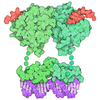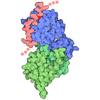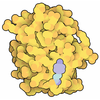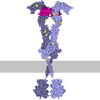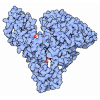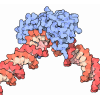+ Open data
Open data
- Basic information
Basic information
| Entry | Database: PDB / ID: 4mg7 | ||||||
|---|---|---|---|---|---|---|---|
| Title | Crystal structure of hERa-LBD (Y537S) in complex with ferutinine | ||||||
 Components Components |
| ||||||
 Keywords Keywords | HORMONE RECEPTOR / ligand-binding domain of nuclear hormone receptor | ||||||
| Function / homology |  Function and homology information Function and homology informationlabyrinthine layer morphogenesis / positive regulation of transcription from RNA polymerase II promoter by galactose / regulation of thyroid hormone receptor signaling pathway / positive regulation of female receptivity / regulation of epithelial cell apoptotic process / antral ovarian follicle growth / regulation of branching involved in prostate gland morphogenesis / NR1H2 & NR1H3 regulate gene expression to control bile acid homeostasis / RUNX1 regulates transcription of genes involved in WNT signaling / RUNX1 regulates estrogen receptor mediated transcription ...labyrinthine layer morphogenesis / positive regulation of transcription from RNA polymerase II promoter by galactose / regulation of thyroid hormone receptor signaling pathway / positive regulation of female receptivity / regulation of epithelial cell apoptotic process / antral ovarian follicle growth / regulation of branching involved in prostate gland morphogenesis / NR1H2 & NR1H3 regulate gene expression to control bile acid homeostasis / RUNX1 regulates transcription of genes involved in WNT signaling / RUNX1 regulates estrogen receptor mediated transcription / regulation of toll-like receptor signaling pathway / epithelial cell development / nuclear estrogen receptor activity / steroid hormone receptor signaling pathway / prostate epithelial cord elongation / epithelial cell proliferation involved in mammary gland duct elongation / prostate epithelial cord arborization involved in prostate glandular acinus morphogenesis / male mating behavior / hypothalamus development / mammary gland branching involved in pregnancy / uterus development / vagina development / negative regulation of smooth muscle cell apoptotic process / TFIIB-class transcription factor binding / cellular response to Thyroglobulin triiodothyronine / androgen metabolic process / Synthesis of bile acids and bile salts / progesterone receptor signaling pathway / protein-lysine-acetyltransferase activity / mammary gland alveolus development / cellular response to estrogen stimulus / estrogen response element binding / Synthesis of bile acids and bile salts via 27-hydroxycholesterol / Endogenous sterols / Synthesis of bile acids and bile salts via 7alpha-hydroxycholesterol / Mitochondrial unfolded protein response (UPRmt) / response to retinoic acid / nuclear receptor-mediated steroid hormone signaling pathway / Nuclear signaling by ERBB4 / : / estrous cycle / nuclear retinoid X receptor binding / : / RORA,B,C and NR1D1 (REV-ERBA) regulate gene expression / Transcriptional regulation of brown and beige adipocyte differentiation by EBF2 / Expression of BMAL (ARNTL), CLOCK, and NPAS2 / Recycling of bile acids and salts / RNA polymerase II preinitiation complex assembly / histone acetyltransferase / cellular response to hormone stimulus / NR1H3 & NR1H2 regulate gene expression linked to cholesterol transport and efflux / positive regulation of nitric-oxide synthase activity / estrogen receptor signaling pathway / protein localization to chromatin / lactation / steroid binding / 14-3-3 protein binding / positive regulation of adipose tissue development / Regulation of lipid metabolism by PPARalpha / TFAP2 (AP-2) family regulates transcription of growth factors and their receptors / peroxisome proliferator activated receptor signaling pathway / positive regulation of neuron differentiation / regulation of cellular response to insulin stimulus / BMAL1:CLOCK,NPAS2 activates circadian expression / SUMOylation of transcription cofactors / Activation of gene expression by SREBF (SREBP) / ESR-mediated signaling / response to progesterone / negative regulation of miRNA transcription / TBP-class protein binding / cerebellum development / negative regulation of canonical NF-kappaB signal transduction / nitric-oxide synthase regulator activity / nuclear estrogen receptor binding / transcription corepressor binding / nuclear receptor binding / stem cell differentiation / transcription coregulator binding / RNA polymerase II transcription regulatory region sequence-specific DNA binding / hippocampus development / SUMOylation of intracellular receptors / cellular response to estradiol stimulus / Heme signaling / PPARA activates gene expression / euchromatin / Transcriptional activation of mitochondrial biogenesis / Cytoprotection by HMOX1 / beta-catenin binding / cerebral cortex development / Nuclear Receptor transcription pathway / Transcriptional regulation of white adipocyte differentiation / mRNA transcription by RNA polymerase II / response to estrogen / RNA polymerase II transcription regulator complex / male gonad development / transcription coactivator binding / nuclear receptor activity / positive regulation of fibroblast proliferation / Constitutive Signaling by Aberrant PI3K in Cancer / positive regulation of nitric oxide biosynthetic process Similarity search - Function | ||||||
| Biological species |  Homo sapiens (human) Homo sapiens (human) | ||||||
| Method |  X-RAY DIFFRACTION / X-RAY DIFFRACTION /  SYNCHROTRON / SYNCHROTRON /  MOLECULAR REPLACEMENT / Resolution: 2.15 Å MOLECULAR REPLACEMENT / Resolution: 2.15 Å | ||||||
 Authors Authors | Delfosse, V. / Grimaldi, M. / Bourguet, W. | ||||||
 Citation Citation |  Journal: Environ.Health Perspect. / Year: 2014 Journal: Environ.Health Perspect. / Year: 2014Title: Structural and functional profiling of environmental ligands for estrogen receptors. Authors: Delfosse, V. / Grimaldi, M. / Cavailles, V. / Balaguer, P. / Bourguet, W. | ||||||
| History |
|
- Structure visualization
Structure visualization
| Structure viewer | Molecule:  Molmil Molmil Jmol/JSmol Jmol/JSmol |
|---|
- Downloads & links
Downloads & links
- Download
Download
| PDBx/mmCIF format |  4mg7.cif.gz 4mg7.cif.gz | 118.8 KB | Display |  PDBx/mmCIF format PDBx/mmCIF format |
|---|---|---|---|---|
| PDB format |  pdb4mg7.ent.gz pdb4mg7.ent.gz | 90.3 KB | Display |  PDB format PDB format |
| PDBx/mmJSON format |  4mg7.json.gz 4mg7.json.gz | Tree view |  PDBx/mmJSON format PDBx/mmJSON format | |
| Others |  Other downloads Other downloads |
-Validation report
| Arichive directory |  https://data.pdbj.org/pub/pdb/validation_reports/mg/4mg7 https://data.pdbj.org/pub/pdb/validation_reports/mg/4mg7 ftp://data.pdbj.org/pub/pdb/validation_reports/mg/4mg7 ftp://data.pdbj.org/pub/pdb/validation_reports/mg/4mg7 | HTTPS FTP |
|---|
-Related structure data
| Related structure data | 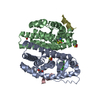 4mg5C 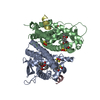 4mg6C  4mg8C  4mg9C  4mgaC  4mgbC 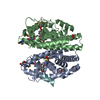 4mgcC  4mgdC  3uudS S: Starting model for refinement C: citing same article ( |
|---|---|
| Similar structure data |
- Links
Links
- Assembly
Assembly
| Deposited unit | 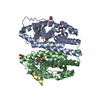
| ||||||||
|---|---|---|---|---|---|---|---|---|---|
| 1 |
| ||||||||
| Unit cell |
|
- Components
Components
-Protein , 2 types, 2 molecules AB
| #1: Protein | Mass: 29054.217 Da / Num. of mol.: 1 / Fragment: ligand binding domain (UNP residues 302-552) / Mutation: Y537S Source method: isolated from a genetically manipulated source Source: (gene. exp.)  Homo sapiens (human) / Gene: ESR, ESR1, NR3A1 / Plasmid: pET32a / Production host: Homo sapiens (human) / Gene: ESR, ESR1, NR3A1 / Plasmid: pET32a / Production host:  |
|---|---|
| #2: Protein | Mass: 29086.217 Da / Num. of mol.: 1 / Fragment: ligand binding domain (UNP residues 302-552) / Mutation: Y537S Source method: isolated from a genetically manipulated source Source: (gene. exp.)  Homo sapiens (human) / Gene: ESR, ESR1, NR3A1 / Plasmid: pET32a / Production host: Homo sapiens (human) / Gene: ESR, ESR1, NR3A1 / Plasmid: pET32a / Production host:  |
-Protein/peptide , 1 types, 2 molecules CD
| #3: Protein/peptide | Mass: 1591.880 Da / Num. of mol.: 2 / Fragment: coactivator peptide SRC-1 (UNP residues 686-698) / Source method: obtained synthetically / Source: (synth.)  Homo sapiens (human) / References: UniProt: Q15788 Homo sapiens (human) / References: UniProt: Q15788 |
|---|
-Non-polymers , 3 types, 267 molecules 
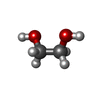



| #4: Chemical | | #5: Chemical | #6: Water | ChemComp-HOH / | |
|---|
-Details
| Has protein modification | Y |
|---|
-Experimental details
-Experiment
| Experiment | Method:  X-RAY DIFFRACTION / Number of used crystals: 1 X-RAY DIFFRACTION / Number of used crystals: 1 |
|---|
- Sample preparation
Sample preparation
| Crystal | Density Matthews: 2 Å3/Da / Density % sol: 38.43 % |
|---|---|
| Crystal grow | Temperature: 291 K / Method: vapor diffusion, hanging drop / pH: 7.75 Details: 320 mM sodium chloride, 100 mM HEPES, 24% PEG3350, pH 7.75, VAPOR DIFFUSION, HANGING DROP, temperature 291K |
-Data collection
| Diffraction | Mean temperature: 100 K |
|---|---|
| Diffraction source | Source:  SYNCHROTRON / Site: SYNCHROTRON / Site:  ESRF ESRF  / Beamline: ID23-2 / Wavelength: 0.8726 Å / Beamline: ID23-2 / Wavelength: 0.8726 Å |
| Detector | Type: MARMOSAIC 225 mm CCD / Detector: CCD / Date: Nov 3, 2011 |
| Radiation | Monochromator: Si(111) / Protocol: SINGLE WAVELENGTH / Monochromatic (M) / Laue (L): M / Scattering type: x-ray |
| Radiation wavelength | Wavelength: 0.8726 Å / Relative weight: 1 |
| Reflection | Resolution: 2.15→43.452 Å / Num. obs: 25819 / % possible obs: 97.9 % / Observed criterion σ(F): 0 / Observed criterion σ(I): 0 / Redundancy: 3.8 % / Rsym value: 0.096 / Net I/σ(I): 13.07 |
| Reflection shell | Resolution: 2.15→2.28 Å / Redundancy: 3.8 % / Mean I/σ(I) obs: 3.34 / Num. unique all: 4020 / Rsym value: 0.479 / % possible all: 94.4 |
- Processing
Processing
| Software |
| ||||||||||||||||||||||||||||||||||||||||||||||||||||||||||||||||||||||
|---|---|---|---|---|---|---|---|---|---|---|---|---|---|---|---|---|---|---|---|---|---|---|---|---|---|---|---|---|---|---|---|---|---|---|---|---|---|---|---|---|---|---|---|---|---|---|---|---|---|---|---|---|---|---|---|---|---|---|---|---|---|---|---|---|---|---|---|---|---|---|---|
| Refinement | Method to determine structure:  MOLECULAR REPLACEMENT MOLECULAR REPLACEMENTStarting model: PDB ENTRY 3UUD Resolution: 2.15→43.452 Å / SU ML: 0.27 / σ(F): 1.99 / Phase error: 22.64 / Stereochemistry target values: ML Details: THE PRESENCE IN THE ASYMMETRIC UNIT OF TWO ESTROGEN RECEPTOR MOLECULES WITH DISTINCT PATTERNS OF SIDE CHAIN MODIFICATION REPRESENTS THE BEST FIT TO THE ELECTRON DENSITY AND IS NOT DERIVED ...Details: THE PRESENCE IN THE ASYMMETRIC UNIT OF TWO ESTROGEN RECEPTOR MOLECULES WITH DISTINCT PATTERNS OF SIDE CHAIN MODIFICATION REPRESENTS THE BEST FIT TO THE ELECTRON DENSITY AND IS NOT DERIVED FROM THE CO-CRYSTALLIZATION OF TWO CHEMICALLY DISTINCT PROTEINS.
| ||||||||||||||||||||||||||||||||||||||||||||||||||||||||||||||||||||||
| Solvent computation | Shrinkage radii: 1.06 Å / VDW probe radii: 1.3 Å / Solvent model: FLAT BULK SOLVENT MODEL / Bsol: 40.35 Å2 / ksol: 0.335 e/Å3 | ||||||||||||||||||||||||||||||||||||||||||||||||||||||||||||||||||||||
| Displacement parameters |
| ||||||||||||||||||||||||||||||||||||||||||||||||||||||||||||||||||||||
| Refinement step | Cycle: LAST / Resolution: 2.15→43.452 Å
| ||||||||||||||||||||||||||||||||||||||||||||||||||||||||||||||||||||||
| Refine LS restraints |
| ||||||||||||||||||||||||||||||||||||||||||||||||||||||||||||||||||||||
| LS refinement shell |
|
 Movie
Movie Controller
Controller




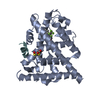

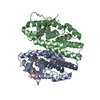
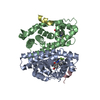

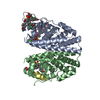


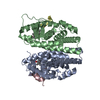
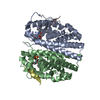


 PDBj
PDBj
